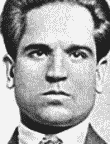Antonio Lombardo

Antonio "Tony the Scourge" Lombardo (1892 – September 7, 1928) was an American mobster. He was advisor, or consigliere, to Al Capone and later President of the Unione Siciliana.
Biography
Born in Sicily on November 23, 1891, Antonio Lombardo immigrated to the United States in the early 20th century where he became a successful wholesale grocery business owner in Chicago, Illinois. A long time Mafia associate, Lombardo became Al Capone's advisor after John Torrio retired in 1925.
Lombardo tried unsuccessfully to negotiate peace between the Chicago Outfit and the North Side Gang during the four-year gang war, suggesting that Capone surrender supposed Dean O'Banion assassins Albert Anselmi and John Scalise, which Capone refused. Lombardo, with the help of Capone, later became President of the Unione Siciliana in November 1925, attempting to regain control of the unstable organization as well as instituting reforms, including opening membership to non-Sicilian Italian immigrants (such as the Neapolitan Capone) and changing the organization's name to the Italo-American National Union.
Lombardo's reforms, however, caused some resentment within Unione Siciliana members. With the partnership of Al Capone and New York gangster Frankie Yale worsening, possibly due to the end of payoffs from the Unione Siciliana to Yale, Lombardo would be challenged for the Presidency by Joe Aiello, supported by Yale, in January 1928.
Lombardo, however, refused to resign and continued to organize civic projects under the Unione Siciliana until shortly before his death on September 7, 1928. Lombardo was gunned down, along with his bodyguard Joseph Ferrara (although bodyguard Joe Lolordo survived), allegedly by an alliance of the Joe Aiello Gang and the North Side Gang, at the intersections of Madison Street and Dearborn Street. It was said that Moran ordered this death and had his two experienced gunman do the job with the help of Aiello. Thought to be retaliation for the murder of Frankie Yale the previous July, Lombardo's death was in turn soon avenged with the murder of members of the Joe Aiello Gang and the St. Valentine's Day Massacre, in 1929. He is buried in Mount Carmel Cemetery in Hillside, Illinois.
Only one gunman was identified in Lombardo's death: a Frank Marco aka Marlo who was killed in New York City February 17, 1931 {See [1]}; a possible unknown accomplice to Marco was killed September 9, 1928 in Michigan.[2] Another suspect was Pietro La Mantia[3]
Further reading
- Asbury, Herbert. The Gangs of Chicago: An Informal History of the Chicago Underworld. New York: Alfred A. Knoff, 1940. ISBN 1-56025-454-8
- Lashly, Arthur V. Illinois Crime Survey. Chicago: Illinois Association for Criminal Justice and the Chicago Crime Commission, 1929.
- Johnson, Curt and R. Craig Sautter. The Wicked City: Chicago from Kenna to Capone. New York: Da Capo Press, 1998. ISBN 0-306-80821-8
- Parr, Amanda Jayne. The True and Complete Story of Machine Gun Jack McGurn: Chief Bodyguard and Hit Man to Chicago's Most Infamous Crime Czar Al Capone and Mastermind of the St. Valentine's Day Massacre. Leicester: Troubador Publishing Ltd., 2005. ISBN 1-905237-13-8
- United States. Congress. Senate. Committee on Governmental Affairs. Permanent Subcommittee on Investigations. Organized Crime: 25 Years After Valachi : Hearings Before the Permanent Subcommittee on Investigation. 1988.
References
- Kelly, Robert J. Encyclopedia of Organized Crime in the United States. Westport, Connecticut: Greenwood Press, 2000. ISBN 0-313-30653-2
- Sifakis, Carl. The Mafia Encyclopedia. New York: Da Capo Press, 2005. ISBN 0-8160-5694-3
- Sifakis, Carl. The Encyclopedia of American Crime. New York: Facts on File Inc., 2001. ISBN 0-8160-4040-0
External links
- The American "Mafia": Who was who ? - L
- Find A Grave: Anthony "The Scourge" Lombardo
- Part III: Chicago's Unione Siciliana, 1920 – A Decade of Slaughter by Allan May
- Part V: Chicago’s Unione Siciliana, 1920 – A Decade of Slaughter by Allen May
| Preceded by Samuzzo Amatuna (1925) |
Chicago Mafia Boss 1925-1928 |
Succeeded by Pasqualino Lolordo (1928-1929) |
| ||||||||||||||||||||||||||||||||||||||||||||||||||||